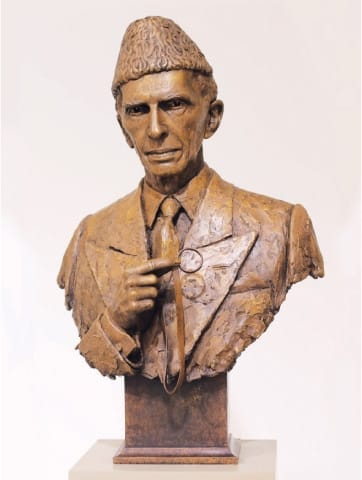Bust commemorating Mohammad Ali Jinnah unveiled in British Museum

By Ahmad Jamal Wattoo, BA Economics and Politics
On Tuesday, the 28th of November, a bust of Mohammad Ali Jinnah, the founder of the Islamic Republic of Pakistan was unveiled at the British Museum in London. The Mayor of London, Sadiq Khan and H.E the Pakistani High Commissioner in London, Syed Ibne Abbas, unveiled the bust at the ceremony, which was attended by over 400 guests, with the sculpture being moved permanently to Lincoln’s Inn later that day.
Jinnah, who matriculated at the young age of 16, was an exceptional student. He was eventually called to the Bar at Lincoln’s Inn on the 29th of April, 1896. Many decades later, he would go on to make history by founding Pakistan, a state for Muslims in South Asia.
The Pakistan High Commission, the organisation responsible for financing the bust and its placement in the prestigious Lincoln’s Inn, stated that the unveiling of Jinnah’s bust was done to commemorate Pakistan’s 70th year of Independence and to pay a befitting tribute to the founder of the nation.
The SOAS Spirit recently spoke to His Excellency, the Pakistani High Commissioner in London, Syed Ibne Abbas and had the opportunity to interview him regarding the sculpture.
Spirit: Who financed the bust and what was the inspiration for this idea?
Syed Ibne Abbas: The bust is financed by the Government of Pakistan but the project was conceived by the Pakistani High Commission three years ago. Regarding how the idea for the bust came about, when I came to the United Kingdom, I saw statues of the people who the government of the United Kingdom wanted to pay tribute to. It occurred to me that despite the fact that Quaid-e-Azam Muhammad Ali Jinnah, the founder of Pakistan had been called to the bar at Lincoln’s Inn and had lived in London for a long time, he did not have any form of recognition or anything to celebrate his presence in the country. Therefore, we decided to have a bust of his likeness made at his old alma mater, Lincoln’s Inn.
Spirit: How long did it take to build it?
Syed Ibne Abbas: The sculpture was built in 6 months and was prepared by a leading sculptor by the name of Philip Jackson. However, the idea was conceived three years ago
Spirit: What other events has the High Commission organised or helped to organise in the past year?
Syed Ibne Abbas: Last year marked the 70th year of the independence of Pakistan. We started the year 2017 by participating in London’s New Year parade. It was the first time ever that any High Commission participated in the parade. It was witnessed by 600,000 people on the streets and about 30 million people view it on their television screens. The second event we organised was the Pakistan Fashion Week, which was held at the prestigious Lancaster House. The third thing we did was that we covered London’s iconic red buses with images that represented Pakistan’s vibrant culture. This was very well received by the public. We showcased all things including landscape and wildlife that make Pakistan unique. We also organised an Anglo-Sufi musical called ‘Ishq’ which was showcased at the Sadler’s Wells Theatre. The last event we organised was the unveiling of the bust of Quaid-e-Azam at the British Museum.
Spirit: Do you have any similar events planned in 2018 to engage the Pakistani community in London?
Syed Ibne Abbas: We have dedicated the year to our outreach and engagement with the youth. Throughout the year, we will be reaching out to the youth and we will be working with them to organise several events. Finally, this year I want to organise an event on Allama Muhammad Iqbal, his philosophy, thoughts and vision of what Pakistan should look like as a country.
Spirit: Pakistan’s image in the world has been tarnished by allegations that the country hosts terrorist factions. What can the average Pakistani do to present a softer image of Pakistan to the rest of the world?
Syed Ibne Abbas: My request to the average Pakistanis is that they should act normally as they already are. No Pakistanis needs to bend over backwards to prove that they are something which they are not. We do not need to prove anything to anyone because our actions speak louder than our words. Moreover, we should be mindful that we represent a country, a culture and should do it justice. Pakistan has always been a moderate and modern society and this is what I think we should try to protect, portray and believe in.




